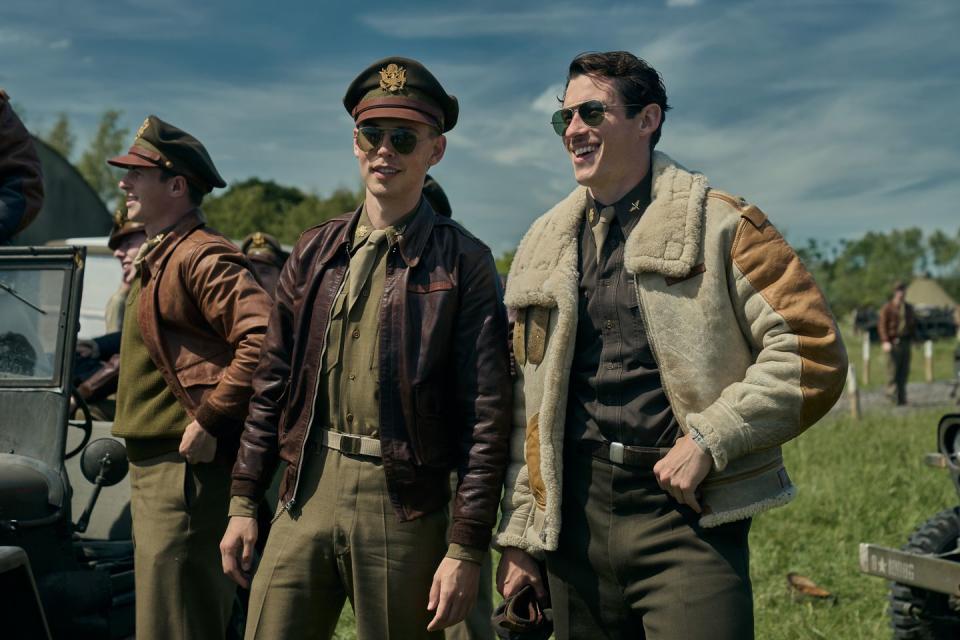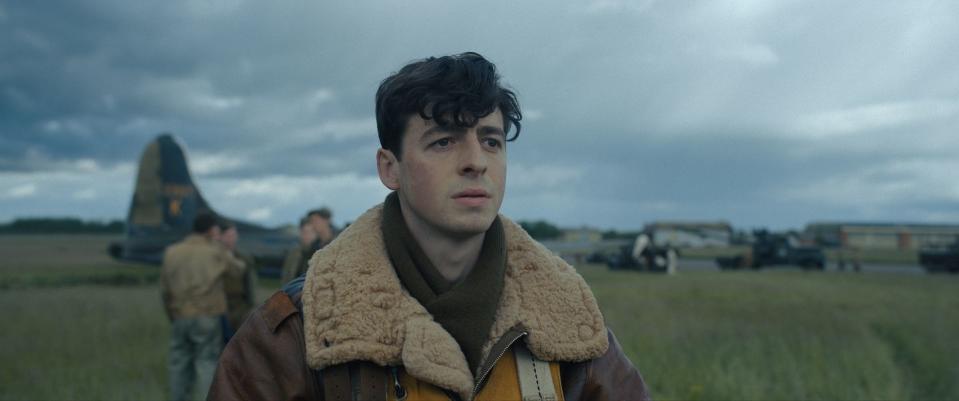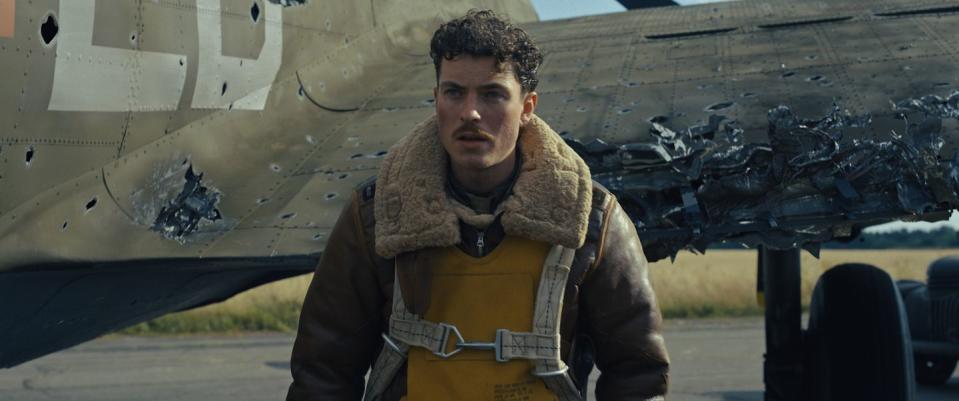The True Story of the Legendary Pilots in 'Masters of the Air'
The United States trained thousands of pilots throughout World War II, but few groups suffered heavier losses than the Eighth Air Force’s 100th Bomb Group. Nicknamed the "Bloody 100th," their reputation as a jinxed unit made the group famous—especially since their positioning in the squadron was very often open to increased enemy fire. As one airman reportedly told a companion with tears running down his face, "I’m not going to make it… they just put me in the 100th Group. I haven’t got a chance."
The group's brave heroics in the face of adversity have been adapted for the small screen in Apple TV+'s Masters of the Air, which is now almost halfway through its planned ten-episode miniseries. It's the latest World War II-centric project from Tom Hanks, Steven Spielberg, and Gary Goetzman, following HBO's Band of Brothers and The Pacific.
Masters of the Air is based on Donald L. Miller’s Masters of the Air: America’s Bomber Boys Who Fought the Air War Against Nazi Germany and Major Harry H. Crosby's memoir A Wing and a Prayer. Much like Band of Brothers's Easy Company, the 100th's members were forced to brave the war together as a group in order to survive. More than their peers, they were often chosen to go on dangerous missions with little hope of survival. Unlike the on-the-ground action of Easy Company, however, the 100th's losses tell a very different story about the war.
Led by star pilots John "Bucky" Egan (Callum Turner) and Gale "Buck" Cleven (Austin Butler), the 100th were considered the heart and soul of the Eighth Air Force. The two men were larger-than-life heroes, idolized by a group that included Lieutenant Curtis Biddick (Barry Keoghan), Sergeant William Quinn (Kai Alexander), and Captain Bernard DeMarco (Adam Long). As Major Crosby (Anthony Boyle) later wrote in his memoir, Egan and Cleven were, "dashing, undisciplined, superb pilots, exactly what Hollywood expected them to be."
Naturally, their journey was a perfect fit for the big-budget treatment in Masters of the Air. Though be warned! The rest of this story will contain historical spoilers beyond the current episode in the series. If you're unfamiliar with the real-life tale and want to learn about the 100th as the series progresses, bookmark this page to read after the series finale.

The 100th's First Combat Mission Was Sobering
Unlike the ground troops in Band of Brothers, the 100th's members were mostly living it up at an airbase in London, England following their initial training. There was a bar called the Silver Wings, where officers and pilots drank, gambled, fought, and eased the trauma caused by the war. The crew was also relatively undisciplined—and they rotated through various commanding officers in 1943. So, when the 100th embarked on their first combat mission over Bremen, Germany, it turned out to be a harrowing and sobering experience. For starters, their planes were supposed to be "flying fortresses," even though enemy fire could still puncture the hull of the aircraft like a piece of paper. As Miller wrote, "Every position in the plane was vulnerable; there were no foxholes in the sky."
The 17-bomber crew returned from Bremen after facing a barrage from the German Luftwaffe, losing three planes and 30 crew members in a baptism of enemy fire. Though Egan had been in the air before with a different bomb group, it was Cleven's first combat mission. "Why didn’t you tell me?" Cleven asks his friend in Masters of the Air's first episode. "You’ve been up... You didn’t tell me it was like that." Egan simply responds, "I didn’t know what to say."

The Heroics of Harry Crosby
Though his memoir serves as partial inspiration for Masters of the Air's story, Harry Crosby begins the series as a replacement navigator who gets horribly airsick on his first mission. Eventually rising up the ranks to Major, his navigational skills were incredibly accurate. One mission, which is portrayed in episode 2 of the series, details a successful bombing of a German U-Boat base in Trondheim, Norway. Deviating from the planned route on the way home due to bad weather and nerves, Crosby reportedly didn't make a single radio report back to home base. Expecting to be court-martialed for insubordination, Crosby was hailed as a hero since his radio silence prevented the German pilots from intercepting their location. The twist of fate is easy to miss in Masters of the Air, but Crosby does receive a quick pep talk from Egan before he's promoted.
There's another Crosby mission that we have to mention, because it feels perfect for television—even though it wasn't depicted in Masters of the Air. According to reports from the National World War II Museum in New Orleans, Crosby would often listen to Beethoven's "Symphony No. 3" at the airbase in London. Just a few weeks after the bombing in Tronheim, he was sent on another mission to Bonn, Germany, which is the birthplace of Beethoven. Reportedly, he played Beethoven's "Symphony No. 3" for the base that same morning. Unable to drop the bombs after he realized that he would destroy Bonn in the process, Crosby shouted, "We can’t bomb Bonn!" The bombers then flew over the city, bomb bay doors open, without dropping a single explosive. Though the event wasn't included in the series, the story depicts how difficult it was for the 100th knowing that they were often detonating in highly populated civilian areas. Committing horrific actions in the war sometimes proved to be too tough an ask for the men.

The Friendship of Cleven and Egan
After two devastating missions in Regensburg and Schweinfurt, Germany, the active numbers of the 100th dwindled. "We thought it was going to be a great run," 100th bombardier Joseph Armanini later told the National World War II Museum. "But then we got into it, hell, it turned out to be a disaster because they shot the living Christ out of us." According to the American Veterans Center, nine of the 22 planes the 100th sent into combat were shot down by enemy forces.
Less than two months later, another raid over the city of Münster proved to be equally destructive. After Cleven's plane was shot down, Egan was quick to take to the skies for a revenge mission. "Others who had lost close friends in the past few raids joined in the cheering because here was a chance to kill Germans, the spawners of race hatred and minority oppression,” Egan recalled in real life. "It was a dream mission to avenge the death of a buddy." However, Egan and his crew never made it to Münster. He and his co-pilot, John Brady (played by Ben Radcliffe in Masters of the Air), were forced to jump out of their plane, the M’lle Zig Zag, as German forces wrecked their formation over the Ruhr Valley.
Egan was captured and taken to Stalag Luft III, a prisoner of war (POW) camp that most of the 100's surviving men spent the remainder of the war. When he arrived, Egan was surprised to find that Cleven was alive and well. "What the hell took you so long?" Cleven reportedly asked him, which is a line repeated in Masters of the Air.
What About the Rest of the 100th?
Unlike the Nazi concentration camps, the base treated the officers with respect, since it was run by fellow German airmen. The prisoners were allowed to receive care packages from the Red Cross, including food, clothing, letters from home, and even baseball gear. Still, many pilots attempted to flee from captivity. A famous event involving 76 airmen escaping through tunnels was even depicted in the 1963 film, The Great Escape.
Those who returned safely from the perilous missions over Regensburg and Münster continued to fight as best they could. The 100th aided the ground troops during the invasion of Normandy on D-Day, attacked communication centers in the Battle of the Bulge, and supplied aid packages to liberated towns that were devastated by the war. One exemplary pilot, Robert "Rosie" Rosenthal (Nate Mann), completed a staggering 53 missions for the 100th. Many other pilots, including Egan and Cleven, even survived to tell the tale. Against all odds, co-producer Kirk Saduski told Smithsonian, "these guys keep getting back into the planes for each other."
You Might Also Like


